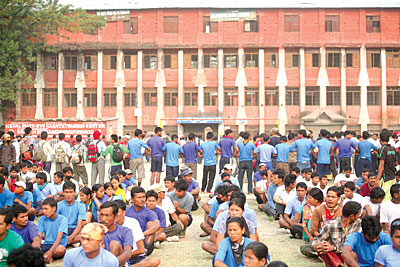 KIRAN PANDAY |
At the time of writing, my neighbour's grandchildren have missed school for the fifth day. Instead of waking up early to pack their bags for school, they have been teasing dogs and encouraging them to battle each other in the alley, disrupting my morning snooze.
They had only been back to school for three days for the new academic session when the All Nepal National Independent Student Union Revolutionary (ANNISU-R) forced all private schools in the country to close. Almost five and a half million students will now remain at home indefinitely as ANNISU-R and the Private and Boarding Schools Organisation of Nepal (PABSON) spar over a 25 per cent increase in fees.
Private schools are registered as companies in Nepal and pay over 25 per cent tax on income, one fifth of which goes towards a fund to support government schools. The Maoist Party seems to recognise them as business entities, too. In 2009, then Finance Minister Baburam Bhattarai proposed taxing private schools an additional five percent so the government could reform the schools in its charge. "It is up to the schools to decide if they want to transfer [the cost] to parents. We don't interfere," he said.
If you recognise private schools as companies, and expect them to make a profit and pay taxes on that profit, why make a fuss when they restructure their service charges?
The Maoist students started their agitation a month after the decision to hike fees was made, without even looking for a negotiation. Were they simply looking to house their cadres in the closed schools before and during the planned May Day rally as Education Minister Sarbendra Nath Shukla alleged? As it turns out, over a dozen schools reported being asked to shelter out-of-town cadre on Wednesday (see picture).
If the private school system were an efficiently working market, then the consumer � the students' guardians � would have more control over how the schools structure their fees. The catfights between PABSON and ANNISU-R would have to be taken out of the classroom, and not lead to school closures, because the guardians would take their children elsewhere. However, this is not an efficiently working market. Like so many things in Nepal, consumer rights are undermined by political capture.
It is particularly distressing in the case of schooling because guardians deem education of their children so important (rightly) that they are prepared to be ridden over roughshod by both schools that charge them ridiculous fees for non-existent facilities and powerful political unions. In Kathmandu, the cost of educating a primary school student is, on average, Rs 11,844 per year (without the admissions fee) while the average annual income is Rs 45,900. A principal at a well-regarded private school says parents are willing to pay beyond their means to ensure their children get what they consider is a good education.
The problem with the current system is that the guardians have no rights or bargaining power. No political party will come to their aid and risk being vilified as elitist when extra taxes get whacked onto private schools, or when they are fleeced with extra charges. What is needed is to secure consumer rights and improve their bargaining power. Regulation is only the means to the end of helping the real consumers, rather than politically affiliated student unions. Apolitical bargaining needs to be mobilised, too, so politics doesn't hold the future of children hostage.
Ultimately, the debate should shift to whether education should be a profit-making industry. In many countries, educational institutions are given charity status and therefore are tax exempt. You cannot be penalised for seeking an education. It is a need, not a luxury. It should be treated as such.
READ ALSO:
They're here - FROM ISSUE #500 (30 APRIL 2010 - 06 MAY 2010)



